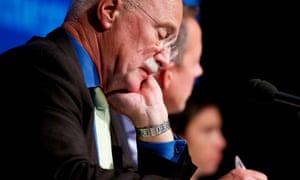
Michael White, the Guardian’s assistant editor, retired last week after almost 45 years at the paper as a reporter, foreign correspondent and columnist. He was political editor from 1990-2006, Washington correspondent (1984-88) and parliamentary sketch writer (1977-84). Here he reflects on his Guardian career.
When did you first know you wanted to be a journalist?
I was never a student journalist but, after failing a few interviews for industry in my final student year, I decided – correctly – that I am by nature an observer, not a doer. I was lucky in my timing: 1966 was a very good time to embark on a career in journalism.
Do you remember your first day at the Guardian?
I was a refugee from the reporters’ desk at the London Evening Standard, where the appointment of Stuart Kuttner, later of News of the World fame, as news editor made me keen to move. On day one at the Guardian, as Derek Malcolm, who was the paper’s film critic, showed me how to subedit the late arts reviews – those of Michael Billington and Nancy Banks-Smith among them – he said: “Do you know, I’m the only film critic in Fleet Street who still has to do this.” I realised I was Derek’s ticket out.
Did you always want to be political editor?
No. But I was always interested in politics and applied for a Westminster vacancy that was earmarked for someone else, who turned it down. Within a year, I was the Guardian’s sketch writer. A lucky fluke, but Machiavelli – a better observer than a doer – was right to say luck is half of everything.
Is there one job you didn’t do that you would have loved to have tried?
War is appalling and mostly to be avoided, but it has a grim fascination. I should like to have been a war correspondent, but only once.
What was your most embarrassing moment?
When I got into slight fisticuffs with the Daily Mirror’s political editor Alastair Campbell over the death of his paper’s proprietor, Robert Maxwell. “It shows there is a God,” I said. I woke next day to find Alastair had been sacked by the new boss, and Fleet Street was proclaiming Maxwell a saintly hero. It was two weeks before Maxwell’s hand was found to have been in the pension fund and I could emerge from the doghouse.

What was your biggest scoop?
I was never very good at finding scoops, which is just as well because I am a scoop sceptic. A few reporters are brilliant at it, but most “scoops” aren’t what they are cracked up to be. There are usually only half a dozen real crackers a year. I value sound judgment of known facts __more highly. Pompous, I realise.
Is there a story that you wish you had written?
I never wrote my best scoop. In the mid-1990s, a well-placed Tory MP told me the Provisional IRA was in ceasefire talks with John Major’s government. I couldn’t get a second source and it was too serious an issue to take a punt on. People might have been killed. And did my source have a suspect ulterior motive? The story was true, but I don’t regret my caution.
What has been the Guardian’s greatest moment during your career?
There have been many, none prompted by me; battles with government – I admire Edward Snowden as I did not Julian Assange – and risky libel victories. When we beat Neil Hamilton and Jonathan Aitken, even Dennis Skinner was impressed. The crime reporter Duncan Campbell’s win over corruption at Stoke Newington nick impressed me greatly because he wrote so modestly about it.

Which of the journalists who you have worked with do you most admire?
I have admired and deplored all my editors, loved my Westminster colleagues, notably Ian Aitken and the much-missed Simon Hoggart, the naughty boy. I admired the leader writer and war hero Mark Arnold-Forster and Mick Downing, father of the NUJ chapel, because they were both understated, and idealistic without being naive, though I would prefer to have been marooned on a desert island with the great cartoonist Posy Simmonds. Among the many Fleet Street rascals with whom I have worked and drank, I have special affection for the late Gordon Grieg, of the Mail, and David Wooding, of the Sun.
Can you sum up the organisation in a sentence?
More than most, the Guardian tries to do the decent thing and sometimes it succeeds.
A final thought after 45 years …
Scepticism towards leaders and institutions is healthy for citizens and journalists, but cynicism is not. In sentimental and credulous times like ours, it can be dangerously corrosive.